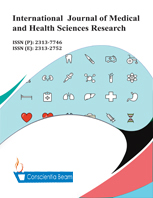Prevalence and Factors Associated With Refractive Error among Primary School Children in Addis Ababa, Ethiopia
Abstract
Introduction: - Refractive errors (myopia, hyperopia and astigmatism) affect the whole spectrum of the population irrespective of age, gender, race and ethnic group. Such refractive errors can be easily diagnosed, measured and corrected with glasses or other refractive corrections to attain normal vision. In the last few years, considerable attention has not been given to the contribution of refractive errors to global cause of visual impairment and blindness. Ethiopia is one of the least developed countries in Africa, with relatively poor health service coverage especially of eye health care and is believed to have one of the world’s highest rates of blindness. Refractive error is the second leading cause of low vision in Ethiopia accounting for 33.4%, and the leading cause of blindness accounting for 7.8%. Objectives:-To assess prevalence and associated factors of refractive error among primary school children. Methods: - An institution based cross sectional study of 1800 students in four elementary schools in Arada and Gullele sub cities was conducted from February 29- April 15, 2014. Subjects were selected by multistage random sampling. Data was collected by pretested questionnaire. Data collected was cleaned, coded and entered to SPSS version 20.0 for analysis. Bivariate logistic analysis using odds ratio was made to assess predictor variables. Beside, multivariate analysis was applied to control confounding variables. A confidence interval, which does not contain one, is significant. Result: - This cross sectional study was comprised of 695 male and 1105 female, from 4 randomly selected elementary schools with a response rate of 99.4%. Refractive errors in either eye or both were present in 71 students (4%). Of these myopia was diagnosed in 19(26.7%), 12(17%) of them have Astigmatism, 10(14%) of them were with Myopic astigmatism, 6(8.4%) of them had Hyperopia, and 3(4.2%) of them had Hyperopic astigmatism on both eyes, 21(29.6%) participants had Anisometropia. Being male and not having visual impairment decreases the odds of refractory error with odds of [(95%AOR.573 (.331-.994) and 95%AOR.312 (.180-.540)] respectively. Conclusion and recommendation: - Refractive error among children is a common problem in school age and they should be screened at least once in their stay in the elementary school.

